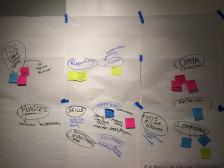Find local data nerds, build a local data hub: Tips from Beth Kanter

More local organizations and funders are eyeing the potential of using data to help inform, engage and serve their communities -- or to understand their community impact. But once you gather or acquire some cool, useful data, then what?
In her recent blog post, Help! My nonprofit needs a data nerd, nonprofit technology expert Beth Kanter explains that most nonprofits don't have "data nerds" on staff. Also, Kanter sees a growing role for community organizations and local funders in the creation of local data hubs.
At a recent gathering of grantees from the Google Nonprofit Program, Kanter learned that most nonprofits lack the capacity, skills and resources to work effectively with data. This can hold them back from implementing great ideas for community engagement or services.
"Basically, they were saying: 'We don't have the skills to analyze, slice and dice, and make sense of data, so it is hard to use it well.' I hear this too often from nonprofits," said Kanter.
Community organizations and projects can benefit from fostering connections with good "data nerds" -- people with skills for gathering or acquiring data, working with databases and data sets, as well as for incorporating data into services and resources that community members can use. This could be something like Chicago CivicWorks' online services, mobile apps, reports, or local services accessed by interactive text messaging.
"Data nerds can do more than help you with statistical analysis, or with setting up a dashboard or survey. They can also help you define success, link it to your mission, and help you zero in on the most important metrics," said Kanter. "You might need a whole team of data nerds, as skills differ."
The people with data skills in your community may not be programmers, data scientists or computer scientists. They may be, say, analysts working for local hospitals, or in the economic development department of local governments. Or archivists at a local library.
Kanter recommends asking around at the organizations you're already connected to. If someone has a reputation for, say creating pivot charts on for Xcel spreadsheets, or importing data from multiple sources into one spreadsheet for analysis, or doing statistical analysis, or setting up a conversion analysis in google analytics -- that's a good sign.
Kanter's post outlined 10 strategies (with lots of links to resources) for finding volunteers and others to assist with data projects:
- Look within your walls.
- Recruit through LinkedIn.
- Free help with Google Analytics from the Analysis Exchange.
- Find a data scientist with a heart.
- Get data training (often for free).
- Read nonprofit-sector blogs that cover data.
- Hire a consultant. (Probably not free, but perhaps very helpful with the right professional.)
- Become someone's homework (working with students).
- Attend a data networking event or conference, especially from organizations such as Data for Good, Data Kind or Code for America. Or search Meetup.com for local data meetup groups, such as Analyze Boulder in Boulder, Colo.
- Read books on data and nonprofit measurement -- like Strengthening Communities with Neighborhood Data, recently published by the Urban Institute.
While people with data skills can be helpful on specific projects, they also can help local organizations and funders create data hubs -- spurring access to, and creativity and collaboration around, local data.
Several communities around the U.S. have created such data centers -- which are not only data repositories, but hubs for networking and collaboration. For instance, in New Haven, Conn., DataHaven is supported by the Community Foundation for Greater New Haven. "The foundation established partnerships with the city's economic development department, and they made several partnerships and relationships with other entities that collect local data," said Kanter.
Similarly in Denver, the Piton Foundation will this month relaunch its Community Facts database of neighborhood-level community statistics. This resource is designed to help Denver-area nonprofits, researchers, community organizers and others better understand and serve communities in need.
At her workshop at GuideStar DonorEdge Learning Conference in May, Kanter guided community foundations through the process of devising campaigns to help address the challenge of communicating about the value of shared data -- and for becoming the community knowledge center (a hub for shared data, useful to donors, nonprofits, and other stakeholders).
"Once your figure out where the data nerds are in your community, bring them together as an advisory group for your data hub. Find out what data is there, and point out the value that data holds for meeting community needs," said Kanter.
Useful data isn't all about spreadsheets and numbers. It can also be "unstructured data" -- like collections of graphics. This can be collected and made available in a data lake -- a repository of data both structured and unstructured. According to Price Waterhouse Coopers, a data lake can "help resolve the nagging problem of accessibility and data integration."
Data projects and data hubs can also be helpful to spur donor interest in local funders. "There's the supply side and demand side to data," said Kanter. "Donors use data to invest holistically and strategically. Data can help them see problems on macro level, and gauge how effective the efforts they fund have been. Have they pushed the needle?"



